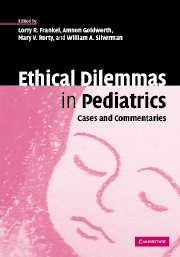Book contents
- Frontmatter
- Contents
- List of contributors
- Preface
- Introduction
- Part I Therapeutic misalliances
- 1.1 Unconventional medicine in the pediatric intensive care unit
- 1.2 Role responsibility in pediatrics: appeasing or transforming parental demands?
- 1.3 Topical discussion
- 2.1 The extremely premature infant at the crossroads
- 2.2 The extremely premature infant at the crossroads: ethical and legal considerations
- 2.3 Topical discussion
- 3.1 Munchausen syndrome by proxy
- 3.2 Some conceptual and ethical issues in Munchausen syndrome by proxy
- 3.3 Topical discussion
- Part II Medical futility
- Part III Life by any means
- Part IV Institutional impediments to ethical action
- References
- Index
1.2 - Role responsibility in pediatrics: appeasing or transforming parental demands?
Published online by Cambridge University Press: 18 August 2009
- Frontmatter
- Contents
- List of contributors
- Preface
- Introduction
- Part I Therapeutic misalliances
- 1.1 Unconventional medicine in the pediatric intensive care unit
- 1.2 Role responsibility in pediatrics: appeasing or transforming parental demands?
- 1.3 Topical discussion
- 2.1 The extremely premature infant at the crossroads
- 2.2 The extremely premature infant at the crossroads: ethical and legal considerations
- 2.3 Topical discussion
- 3.1 Munchausen syndrome by proxy
- 3.2 Some conceptual and ethical issues in Munchausen syndrome by proxy
- 3.3 Topical discussion
- Part II Medical futility
- Part III Life by any means
- Part IV Institutional impediments to ethical action
- References
- Index
Summary
Introduction
When thinking about cultural differences and the care of children, it is tempting to view a child's culture rather than the child herself as the appropriate recipient of diagnosis and treatment. That is because we have come to value cultural heritage as a defining feature of our identities. Of course, one's heritage has little meaning unless it is respected, perhaps affirmed, by others and by public culture at large. As Charles Taylor puts the point, today's concern for culture and respect is premised on the idea “that our identity is partly shaped by recognition or its absence, often by the misrecognition of others, and so a person or group … can suffer real damage, real distortion, if the people around them mirror back to them a confining or demeaning or contemptible picture of themselves.” Our “sense of self” depends on internalizing the views that others have of us, and the lack of recognition “can inflict harm, can be a form of oppression,” imprisoning us “in a false, distorted, and reduced mode of being” (Taylor 1992: 25).
That said, in healthcare settings, especially pediatric settings, respect for culture and identity might crowd out other important values. In an age that urges us to recognize and perhaps affirm particular cultural and personal backgrounds, there is the danger that respecting a patient's heritage might compromise care for that patient's bodily needs. In healthcare settings informed by identity politics, a child's true particularity, or particular claims to care, can get lost.
- Type
- Chapter
- Information
- Ethical Dilemmas in PediatricsCases and Commentaries, pp. 21 - 29Publisher: Cambridge University PressPrint publication year: 2005



